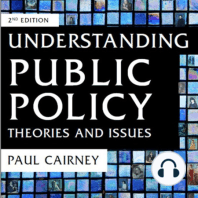14 min listen

Policy Concepts in 1000 Words: The Advocacy Coalition Framework
Policy Concepts in 1000 Words: The Advocacy Coalition Framework
ratings:
Length:
13 minutes
Released:
Jan 12, 2021
Format:
Podcast episode
Description
[compare with the more recent Policy in 500 Words: The Advocacy Coalition Framework]
From Policy Concepts in 1000 Words: The Advocacy Coalition Framework:
Sabatier and Jenkins-Smith developed the ACF to describe and explain a complicated policymaking environment which:
contains multiple actors and levels of government;
produces decisions despite high levels of uncertainty and ambiguity;
takes years to turn decisions into outcomes; and,
processes policy in very different ways. Some issues involve intensely politicized disputes containing many actors. Others are treated as technical and processed routinely, largely by policy specialists, out of the public spotlight.
The ACF’s key terms are:
Beliefs. People engage in politics to translate their beliefs into action. There are three main types. ‘Core’ are fundamental and unlikely to change (like a ‘religious conversion’) but too broad to guide detailed policy (such as one’s views on human nature). ‘Policy core’ are more specific (such as the proper balance between government and market) but still unlikely to change. ‘Secondary Aspects’ relate to the implementation of policy. They are the most likely to change, as people learn about the effects of, say, regulations versus economic incentives.
Advocacy coalition. A coalition contains, ‘people from a variety of positions (elected and agency officials, interest group leaders, researchers) who share a particular belief system’ and ‘who show a non-trivial degree of coordinated activity over time’.
Policy learning. Coalitions learn from policy implementation. Learning takes place through the lens of deeply held beliefs, producing different interpretations of facts and events in different coalitions. Learning is a political process – coalitions selectively interpret information and use it to exercise power. In some cases, there are commonly accepted ways to measure policy performance. In others, it is a battle of ideas where coalitions ‘exaggerate the influence and maliciousness of opponents’. Technical information is often politicised and a dominant coalition can successfully challenge the data supporting policy change for years
Subsystems. Coalitions compete with each other to dominate policymaking in subsystems. Subsystems are issue-specific networks. They are pervasive in government because elected officials devolve policymaking responsibility to bureaucrats who, in turn, consult routinely with participants such as interest groups. While the literature on ‘policy communities’ and ‘monopolies’ describes the potential for insulated relationships between a small number of actors, the ACF identifies many actors in each coalition
Policy broker and sovereign. Subsystems contain actors who mediate between coalitions and make authoritative decisions (although policymakers may be members of coalitions).
Policy change over a ‘decade or more’. We are generally talking about relationships, policies and change over a full ‘policy cycle’.
Enlightenment. Core beliefs are ‘normative’ and ‘largely beyond direct empirical challenge’; unlikely to change during routine policy learning in one cycle. However, they may change over decades.
[see post for more]
From Policy Concepts in 1000 Words: The Advocacy Coalition Framework:
Sabatier and Jenkins-Smith developed the ACF to describe and explain a complicated policymaking environment which:
contains multiple actors and levels of government;
produces decisions despite high levels of uncertainty and ambiguity;
takes years to turn decisions into outcomes; and,
processes policy in very different ways. Some issues involve intensely politicized disputes containing many actors. Others are treated as technical and processed routinely, largely by policy specialists, out of the public spotlight.
The ACF’s key terms are:
Beliefs. People engage in politics to translate their beliefs into action. There are three main types. ‘Core’ are fundamental and unlikely to change (like a ‘religious conversion’) but too broad to guide detailed policy (such as one’s views on human nature). ‘Policy core’ are more specific (such as the proper balance between government and market) but still unlikely to change. ‘Secondary Aspects’ relate to the implementation of policy. They are the most likely to change, as people learn about the effects of, say, regulations versus economic incentives.
Advocacy coalition. A coalition contains, ‘people from a variety of positions (elected and agency officials, interest group leaders, researchers) who share a particular belief system’ and ‘who show a non-trivial degree of coordinated activity over time’.
Policy learning. Coalitions learn from policy implementation. Learning takes place through the lens of deeply held beliefs, producing different interpretations of facts and events in different coalitions. Learning is a political process – coalitions selectively interpret information and use it to exercise power. In some cases, there are commonly accepted ways to measure policy performance. In others, it is a battle of ideas where coalitions ‘exaggerate the influence and maliciousness of opponents’. Technical information is often politicised and a dominant coalition can successfully challenge the data supporting policy change for years
Subsystems. Coalitions compete with each other to dominate policymaking in subsystems. Subsystems are issue-specific networks. They are pervasive in government because elected officials devolve policymaking responsibility to bureaucrats who, in turn, consult routinely with participants such as interest groups. While the literature on ‘policy communities’ and ‘monopolies’ describes the potential for insulated relationships between a small number of actors, the ACF identifies many actors in each coalition
Policy broker and sovereign. Subsystems contain actors who mediate between coalitions and make authoritative decisions (although policymakers may be members of coalitions).
Policy change over a ‘decade or more’. We are generally talking about relationships, policies and change over a full ‘policy cycle’.
Enlightenment. Core beliefs are ‘normative’ and ‘largely beyond direct empirical challenge’; unlikely to change during routine policy learning in one cycle. However, they may change over decades.
[see post for more]
Released:
Jan 12, 2021
Format:
Podcast episode
Titles in the series (34)
Policy Concepts in 1000 Words: Bounded Rationality and Incrementalism by Understanding Public Policy (in 1000 and 500 words)